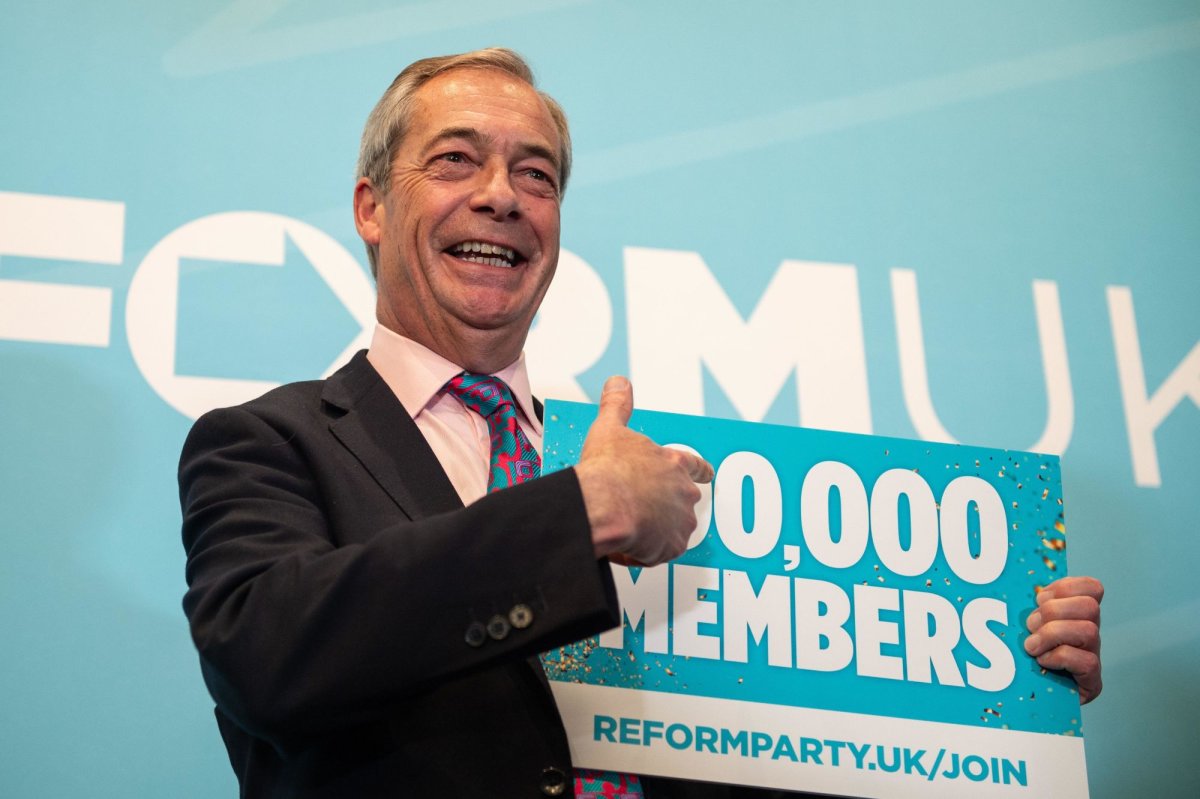
5 min read
Middle-class and older Reform members look and think much like Conservative members – except in one crucial respect, finds Tim Bale
Nigel Farage has been banging on about ‘the People’s Army’ for over a decade. Turns out he’s finally recruited one. Reform UK says it now has a membership of well over 100,000, overtaking that of the Conservatives. So, who are those members, what are they like, what do they think, and what might they do for the party?
Just after the election, we – the Party Members Project run out of Queen Mary University of London and Sussex University – surveyed the members of five UK-wide political parties, including Reform UK. Here’s what we found.
Age-wise, there’s not much to distinguish Reform UK from other parties, especially the Conservatives. Their average age is 61 – not surprising when hardly any of them are aged 18 to 24 – very nearly half of them are over 65 and a third of them are aged between 50 and 64.
Like the members of other parties, they are predominantly middle-class: six in 10 of them fall into the ABC1 category, although that would still make Reform an ever-so-slightly more working-class party than Brexit or UKIP. It’s also a little less male-dominated, even though six out of 10 members are men. It’s not, however, any more representative of the North or the Midlands than those parties were, with about a fifth of members come from each of those two regions. But London-centric they are not: only five per cent live in the nation’s capital.
As to their values: they’re particularly keen on order, fairness, love of country, tradition, and some 95 per cent agreed that “respect for authority is something all children need to learn”. Some 98 per cent also said they were proud of Britain’s history, so they’re no more likely than their Conservative counterparts to appreciate criticism of our imperial past. And Reform members were even more likely to think that “men and women each have different roles to play in society”– a statement with which 85 per cent of them agreed. More generally, nearly all of them voted leave and some 90 per cent see themselves as on the right of the ideological spectrum: 29 per cent “right-of-centre”, 50 per cent “fairly right-wing”, and 11 per cent as “very right-wing”.
As far as individual policy issues are concerned, Reform UK members look a bit like Tory members, only more so – and occasionally much more so. For example, opposition to the UK’s commitment to cutting carbon emissions to net zero by 2050 is fairly widespread among the Conservative grassroots at 45 per cent; among Reform members that figure rises to 86 per cent. On immigration, the gap is much smaller: the proportion of members thinking immigration has been too high over the last decade is 92 per cent for the Conservatives, and 98 per cent for Reform UK.
Reform members may well be even more Thatcherite
Interestingly, and this is where there may be an awkward mismatch between Reform’s members and its target voters, some 56 per cent of the party’s members thought government should cut taxes and spend less on public services, rather than increase taxes and spending or leave things as they are. Since only 44 per cent of Tory members said the same, Reform members may well be even more Thatcherite than they are.
Reform members are also, of course, huge fans of Farage – not surprising, perhaps, when the top three qualities of a leader Reform members picked were qualities that Farage possesses in abundance: “being able to stand up for the UK in dealing with other countries” (61 per cent), “being in touch with ordinary people” (55 per cent), and “being a good communicator” (37 per cent).
Digging a little deeper into the darker side of Reform UK members’ views on leadership only strengthens the impression that Farage is very much the right man in the right job. Only 14 per cent said they didn’t like “charismatic leaders who show off every now and then”, as against 55 per cent who did. A mere five per cent weren’t keen on “leaders who can give as good as they get on social media”, whereas 81 per cent were. And a whopping 96 per cent said they were into “leaders who aren’t afraid of speaking bluntly and stirring up a bit of controversy”.
So, the People’s Army is right behind Farage. But does that mean they’ll help him win the electoral war – particularly the ground war?
If the answer involves leafletting and canvassing, then perhaps not: during the 2024 election campaign, Reform UK members were generally less likely to get involved in those activities than members of the other four parties.
If, however, we’re talking about online, then it’s a very different story. We asked whether members had “shared or liked something which promoted their party and/or its policies on social media”. The responses? Tories, 45 per cent. Lib Dems, 48. Labour, 57. Greens, 67. And Reform UK? Top on 71 per cent.
Watch this space – and Facebook, TikTok and X.
Tim Bale, author and professor of politics at Queen Mary University of London.
PoliticsHome Newsletters
PoliticsHome provides the most comprehensive coverage of UK politics anywhere on the web, offering high quality original reporting and analysis: Subscribe

























+ There are no comments
Add yours